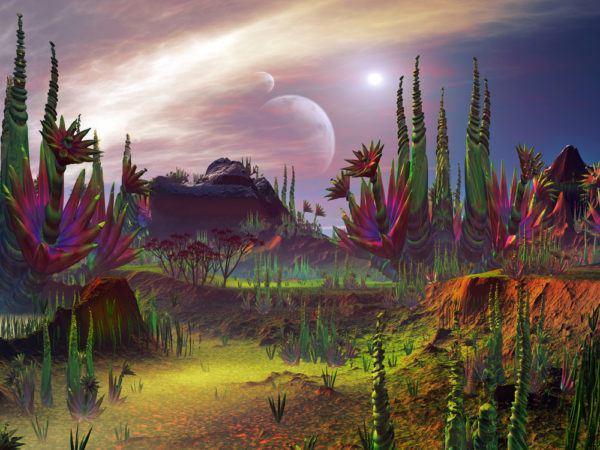
I’ve been reading fantasy and sci-fi since I was in second grade – for those counting, that’s forty-six years. I always loved escaping into a different world through a good book, somewhere utterly unlike the place I knew growing up.
I came by this desire honestly. My mother was (and still is) a voracious SFF reader, and was a card-carrying member of the Science Fiction Book Club. I worked my way through her shelf of other worlds one by one as a kid.
I especially loved sci-fi that was set on another world, one that was full of strange ideas and creatures. Sounding out the names for alien beasties and thrilling to their taste on my tongue remains one of my favorite things about these stories.
There’s an ongoing debate in the SFF community over using “alien” words that goes something like this:
Person A: It’s not a horse. It’s an urse. Sure, it’s used for riding around on, and fulfills all the basic functions of the animal that we know on Earth. But it evolved along an entirely different evolutionary path on a world far distant from our own. It’s not a horse. It’s an urse.
And the usual reply:
If it walks like an horse and talks like a horse, just call it a horse so you don’t confuse the reader.
Sigh.
For me, a lot of the charm of an alien world is its very alienness, and that’s harder to convey if you use only Earth names for things. Especially if your narrators were born to that world and not to Earth.
Sure, if an astronaut from NASA sets down on this alien world and sees someone riding an urse, he may decide, based on his own frame of reference, that it’s basically a horse, and then call it such from there on.
I have no problem with that.
But when Jelrik the Sreemen Heek slithers out of his sleep pod, wipes off the sleep slime, and after drinking a mug of zuhu to wake themself up, heads out on his trusty horse to check his fences… yeah, well that’s gonna make me crazy (unless the writer informs me that he bought the horses from a passing Earth trader. There are exceptions to everything LOL).
I like to name things on human-explored worlds in a way that approximates those they were used to back home. So on my new world Tharassas, I have urses (horses), eircats (predatory feline analogs) and erphins (kinda like dolphins). It’s a way to both conveys the alienness of the creature or thing, while providing a “bridge” for the reader to get there from what they already know.
It also matters who your readership is. Sci-Fi readers in particular are used to alien names in their stories, while folks who tend to read romance or mystery or historical fiction may have a much harder time with them.
And of course, it’s possible to take things too far. If every other word in your story is shlmzk or pyggyfoo or zrthuk, your reader will probably jump ship and never return. Alien names generally need to be pronounceable and used sparingly. They’re the oregano and rosemary in the recipe, not the meat and potatoes.
In my own writing I sprinkle them in where appropriate. And where I can get away with the Earth name in the context of the story, I’m not afraid to use it.
So yeah, sometimes an urse is not a horse. But if it is, I’ll be sure to tell you!
To my writer friends, how do you use alien names in your own stories? Readers, how do you feel about them?
